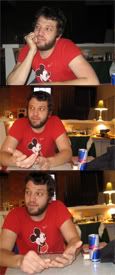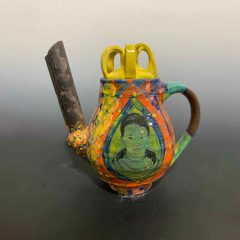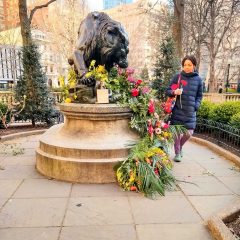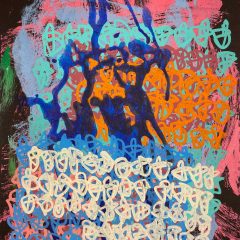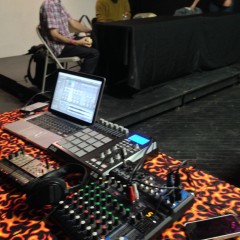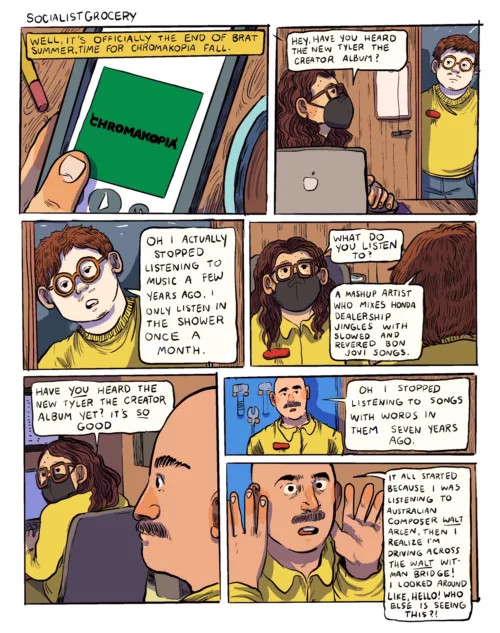SO WHY STOP?
Annette: Why are you shutting the doors?
Paul: Some of my favorite times here have had to do with people coming in from out of town.
Annette: The shows that have included people from out of town?
Paul: Yes. For instance, there are no local artists in this current show, and that’s nothing I was trying to do, it just sort of happened that way. Ironically the show is called Local Color.
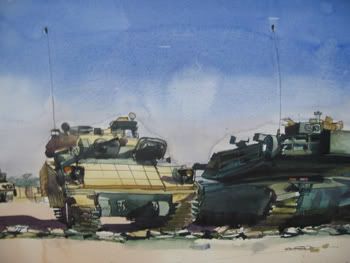
A Steve Mumford watercolor from Publico’s current exhibition, Local Color.
Annette: But it’s exciting? Having people from out of town?
Paul: It’s exciting. Yeah. It brings people into the city and that starts to erode some of the negative feelings that people have about this city. This city, Cincinnati, has this whole self-hatred problem, that’s just stupid.
Annette: What is that self-hatred?
Paul: It’s just a drag, it’s in the mid-west, there’s not enough culture and stuff.
You know, there are things that are really beautiful about living in the mid-west and there are other things that are just an up-hill battle. There is less culture. You have to have a thicker skin to live here, because homophobia and bigotry of all kinds are much more prevalent here. Living in Over-the-Rhine, which is an underprivileged neighborhood has definitely changed my life. Where am I going with all this?
Annette: What’s next?
Paul: Oh, yeah. Why am I quitting? I like bringing people in from out of town. These last couple of years especially I’ve just put myself in these situations where I’ve been really abusive to my body and haven’t slept. There have been these monumental installation periods that are pretty taxing. I’ve worked with some great people like David Ellis, who’s ten years older then me and pushes himself ten times harder. I really look up to that guy. I’ve learned a lot and benefitted from working with people like him here but I’ve started to realize that I don’t need to be curating twelve shows a year. I could curate two or three and learn just as much.
The bottom line for me right now is that I’ve got to start putting my own work first. I’ve been putting it second for the past five years, I’ve been putting pretty much everything in my life second for the past five years.
Five years is a good run for a space like this. I have lost so much money.
IT COSTS MONEY. I DON’T HAVE MONEY. IT TAKES TIME.
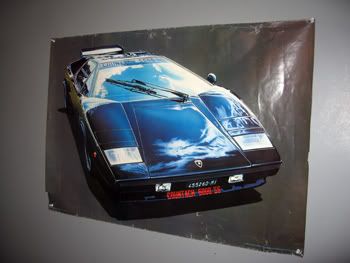
A poster that hangs in Publico’s bathroom that is super-awesome.
Annette: Why is five years a good run?
Paul: This is why: It costs money. I don’t have money. It takes time. I have very little time. It’s taxing. Our fund-raiser money from last year has been gone for the past six months so it’s all coming from my pocket.
Annette: But why was it important to run the gallery the way you ran it? In a way that pretty much assures you of making no money?
Paul: For one thing it’s liberating to not have to rely on the gallery needing to make money. The gallery doesn’t really need to make that much money. Our costs aren’t that much. From time to time the costs are more but I have a pretty good job now so I’m more then happy to step up and give money to the things that I’m passionate about.
Once you cross a commercial line you’re going to eventually have to sacrifice some degree of freedom. This way we can show stuff we really care about and we can bring stuff into Cincinnati that people want to see. The mid-west can be just as viable a location for culture and to live in as the coasts.
THE MID-WEST
Annette: Did you feel a need to prove that?
Paul: Not at first. Now I do. At first it was pretty base; ‘I know a lot of people who make great work and they need a place to show’ but I’ve grown up a lot in the past five years, you start to learn things and ideas evolve.
Yeah, I do. We get people coming in from all over the country, musicians come from wherever, the coasts, or whatever highly populated city and they’re really impressed. They like it. They feel the energy, they say ‘Cincinnati is cool’ and I’m always seconding that. It’s a cool place, and then you start to think, if I can live in the mid-west, and this place is ridiculously cheap. If I can live here, have a huge place that’s great, have a good job-I bar tend now, I only work three days a week and live totally comfortably. I have four days a week that up to this point has awarded me the opportunity to run a gallery-what else can I do? I can travel. I can go put my own shows on. I can curate maybe one show a year and still bring people into Cincinnati which I like doing. It’s just possible. It is.
Creative to me is energy and new. Consistent reconsideration. Part of that energy to me is rebellion and if fifty percent or more of the creative people in my generation are moving to the coasts, there’s just this natural teenager in me that says ‘fuck that, I’m not doing that shit.’
I’m constantly wanting to do things better and I’ve found myself recently reflecting on how I can be more effective as an artist in 2008, globally. I start to think about how good I actually have it here and it’s 2007 for gosh sakes, e-mail is so easy. All these people (gestures to the space around him). . .
THE INTERNET
Annette: You curated this show by e-mail?
Paul: Oh, yeah. Everybody except for this one guy here in the middle I e-mailed cold.
Annette: That’s how I roll as well.
Paul: E-mail cold. That’s one thing I’ve learned; how easy it is to hang out with cool people if you really want to. If you are doing something cool, artists, creative people, they just want to meet other creative people and feel the vibe.
Annette: So. Wait. Is this all about being cool?
Paul: I’m just using dumb words. I mean meeting interesting people, people who are going to spawn inspiration in myself.
No. It’s really just about being an effective artist in the world, e-mail and the internet are both super-awesome and free. I feel like we’re at this threshold moment. . . I don’t know.
Annette: Yeah. No. I feel like it’s possible to be global and local. . .
Paul: And be poor.


